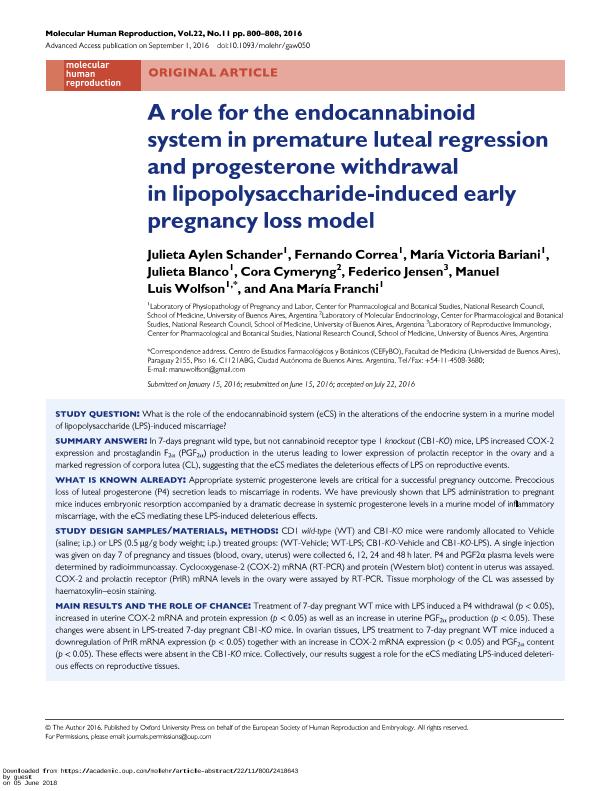Artículo
A role for the endocannabinoid system in premature luteal regression and progesterone withdrawal in lipopolysaccharide-induced early pregnancy loss model
Schander, Julieta Aylen ; Correa, Fernando Gabriel
; Correa, Fernando Gabriel ; Bariani, Maria Victoria
; Bariani, Maria Victoria ; Blanco, Julieta; Cymeryng, Cora Betriz
; Blanco, Julieta; Cymeryng, Cora Betriz ; Jensen, Cristian Federico
; Jensen, Cristian Federico ; Wolfson, Manuel Luis
; Wolfson, Manuel Luis ; Franchi, Ana Maria
; Franchi, Ana Maria
 ; Correa, Fernando Gabriel
; Correa, Fernando Gabriel ; Bariani, Maria Victoria
; Bariani, Maria Victoria ; Blanco, Julieta; Cymeryng, Cora Betriz
; Blanco, Julieta; Cymeryng, Cora Betriz ; Jensen, Cristian Federico
; Jensen, Cristian Federico ; Wolfson, Manuel Luis
; Wolfson, Manuel Luis ; Franchi, Ana Maria
; Franchi, Ana Maria
Fecha de publicación:
11/2016
Editorial:
Oxford University Press
Revista:
Molecular Human Reproduction
ISSN:
1360-9947
Idioma:
Inglés
Tipo de recurso:
Artículo publicado
Clasificación temática:
Resumen
Appropriate systemic progesterone levels are critical for a successful pregnancy outcome. Precocious loss of luteal progesterone secretion leads to miscarriage in rodents. We have previously shown that lipopolysaccharide (LPS) administration to pregnant mice induces embryonic resorption accompanied by a dramatic decrease in systemic progesterone levels in a murine model of inflammatory miscarriage. Furthermore, we showed that the endocannabinoid system (eCS) mediated LPS deleterious effects. The aim of this study was to explore the participation of the endocrine system in the LPS-induced miscarriage as well as the role of the eCS in this process. We found that LPS increased the expression of COX-2 and the production of PGF2α in the uterus of 7-days pregnant mice. Increased production of PGF2α resulted in a lower expression of prolactin receptor in the ovary and a marked regression of corpora lutea (CL), which thus produces less progesterone and consequently, results in embryo resorption. Remarkably, these effects were completely absent in CB1-knockout pregnant mice. Our results clearly suggest that the absence of CB1 receptor confers resistance to LPS deleterious actions during pregnancy. Moreover, lack of CB1 receptor protected from LPS-induced premature luteal regression.
Palabras clave:
Luteolysis
,
Endocannabinoid System
,
Cox-2
,
Pgf2a
,
Prolactin Receptor
Archivos asociados
Licencia
Identificadores
Colecciones
Articulos(CEFYBO)
Articulos de CENTRO DE ESTUDIOS FARMACOLOGICOS Y BOTANICOS
Articulos de CENTRO DE ESTUDIOS FARMACOLOGICOS Y BOTANICOS
Citación
Schander, Julieta Aylen; Correa, Fernando Gabriel; Bariani, Maria Victoria; Blanco, Julieta; Cymeryng, Cora Betriz; et al.; A role for the endocannabinoid system in premature luteal regression and progesterone withdrawal in lipopolysaccharide-induced early pregnancy loss model; Oxford University Press; Molecular Human Reproduction; 22; 11; 11-2016; 800-808
Compartir
Altmétricas



